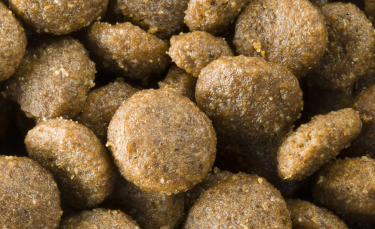 and
and
choose “cereal free” food for dogs. Is this a fashion effect and trend, or is it really beneficial to the health of dogs? Can we really get rid of cereal from dog food? Are there any similarities or differences between the strict carnivorous diet of wolves, the gluten free diet of humans and the balanced diet of dogs? Here is a small and practical guide to help you get rid of stereotypes about Dog Diet and make wise choices. Starch, indigestible? Myth or reality? Starch is not absolutely necessary, but the useful starch digestibility is between 1 and 10, depending on the fun of dogs and food? What does “no cereal” mean?
for a long time, the preparation of biscuits requires a minimum of cereals (wheat, corn, rice, barley, oats, rye, etc.) to meet the extrusion cooking process and provide dry food with moisture less than 10%. With the development of this technology and the continuous improvement of formula technology, people have proposed other raw materials. The intake of starch, the main carbohydrate source, is equivalent to that of tubers (potatoes, sweet potatoes, cassava) and beans (lentils, peas, chickpeas). “KDSPE”“KDSPS” The structures of the obtained starches are slightly different. They are more or less easy to process, resulting in a variety of “cereal free” biscuit formulas. The quality of cereals in dog feed is crucial because corn and wheat seeds may contain mycotoxins, toxic and dangerous molds that grow during snack preservation. But to be honest, he never gave his dog a piece of bread! In addition to starch, grains can also provide protein (even if the amino acid composition is incomplete), fatty acids and phosphorus. The absence or presence of
and
grains is independent of the quality of the remaining selected components, It is not conducive to the good digestibility of food, nor is it conducive to achieving nutritional balance through the intake of protein and all its amino acids, essential fatty acids, minerals and all vitamins or trace elements required by dogs.
Therefore, it can be said that choosing “cereal free” biscuits is more in line with a trend, that is, choosing new ingredients to feed dogs is a bit like “wheat gluten free”, but it can never really avoid the intake of starch.
starch, is it difficult to digest? Myth or reality? There is no scientific basis for
to completely remove the starch source in dog rations. In fact, the foraging behavior of domesticated dogs is not that of wolves. It is not a strict predator, prey hunter. Until recently, scientists have observed a group of fierce, free-moving dogs sharing garbage from Italian landfills. Dog is a symbiotic animal of human beings. It naturally eats its residues.
and
provide a new food source for dogs by planting grains. Dogs can easily adapt to it because of its initial (genetic) enzyme capital It can digest many different food sources. It is made of amylase (amylase). Amylase is a pancreatic enzyme that allows it to digest the starch in cereals and directly enter the intestine, unlike wolves. Therefore, the expression of 10 genes is related to enzyme equipment, which can distinguish dogs from wolves
gets suggestions from woopets by registering for a newsletter. I register that your email address is collected by woopets so that you can receive our news and business offers. Although it is not absolutely necessary to learn more about starch, the useful
dog likes meat, especially its meat, because it can also bear and find high-fat and energy-efficient food. It is an ideal choice in the period of hunger (dogs delivered to themselves have developed various storage mechanisms to adapt to the shortage or imbalance of food resources), but the times have changed, and lipid intake must be moderate to combat the risk of sedentary and obesity.
Starch is a complex carbohydrate that can be absorbed by dogs if cooked and gelatinized; it can compensate for the reduction in total energy intake by maintaining the amount of food and looking for the dog’s sense of satiety. The energy provided by animal proteins is expensive in terms of ecological footprint and catabolism (so-called “new glucose production”) During recovery, illness, vigorous muscle exercise and oxygenation, additional protein intake is often provided to meet basic needs. Therefore, the longer a dog sits, the more carbohydrate (and therefore starch) sources Its energy intake will be the first choice. The less sedentary time, the greater the intake of protein (plants and animals) or fat. The development of starch digestion is gradual, and the digestive ability of puppies is different from that of adult dogs, especially in the first few months. Therefore, it is necessary to reduce the starch content and gradually integrate it into the feed to induce the secretion of amylase required for digestion. All undigested starch blocks the stool and causes flatulence because it is fermented by Escherichia coli. The digestive capacity of starch in adulthood is individualized.
recently studied 53 dogs from 20 different breeds (2) Research shows that the starch digestibility of dogs is between 1 and 10. It is impossible to determine an ideal and universal level of starch added to dog feed, but in the range of 20% to 40% dry matter. As part of diabetes, your veterinarian will provide various carbohydrate sources with low glycemic index, such as pasta, lentils, boiled potatoes, whole rice… And then provide a family diet with starch intake limited to 20-25% of energy demand
also read: organic dog food
and the fun of all these foods?
Choosing a “cereal free” snack can also be for your dog’s taste. It often expresses food preferences, which will guide you to choose a specific recipe. When cereal substitutes, the smell of meat seems to be Why not? As long as you respect the quality and nutritional balance, you don’t tend to reduce the total amount so as not to bring too much energy (too high fat content) to it The correct balance of essential nutrients is calibrated in snacks and must be observed in quantities to avoid undernutrition or excess
Axelsson e et al. The genomic characteristics of dog domestication reveal the adaptation to a starch rich diet. Naturally. 2013; 495(7441):360-364。 Arendt ml. et al. Amylase activity is related to the copy number of amy2b in dogs: effects on dog domestication, diet and diabetes. Animal genetics. 2014; 45:716-722








